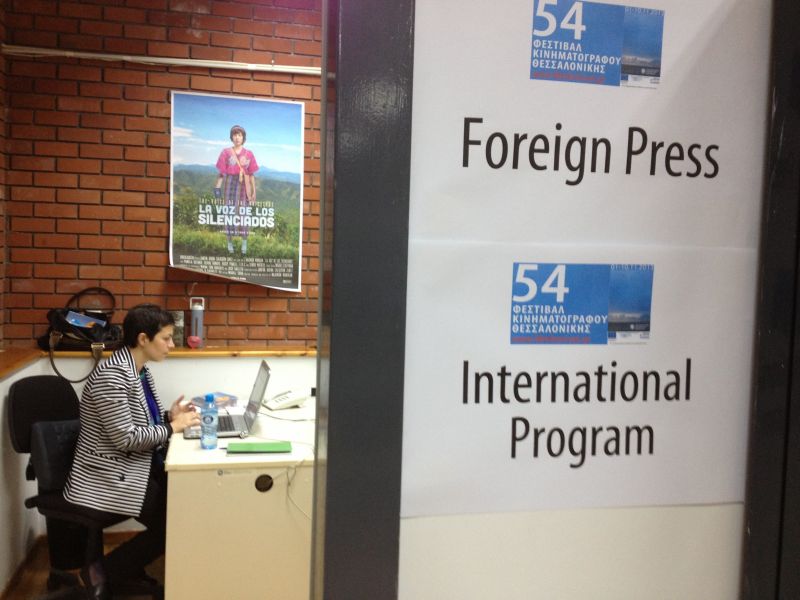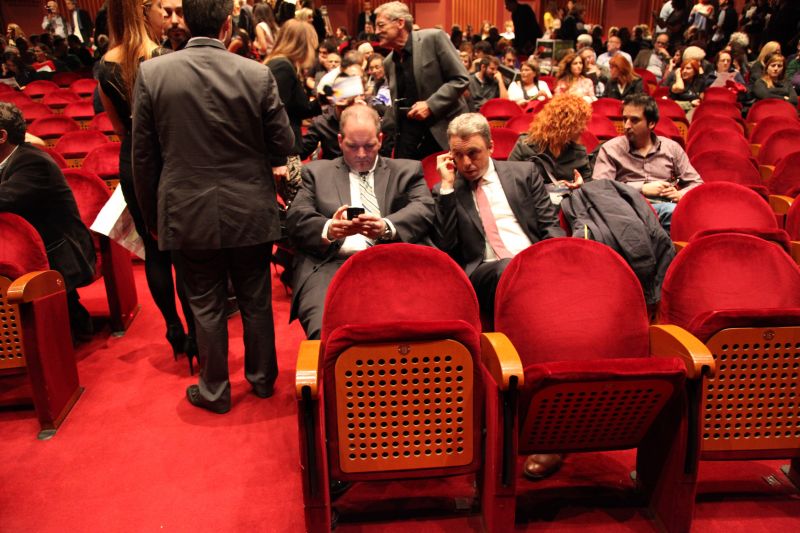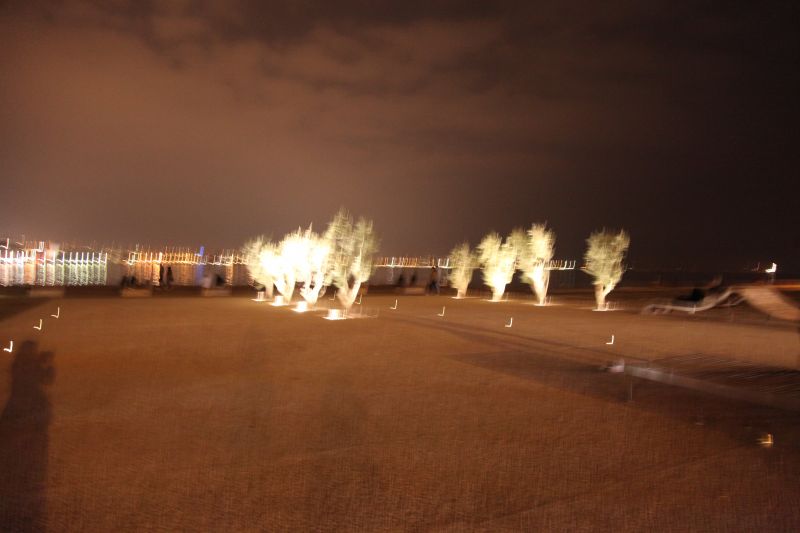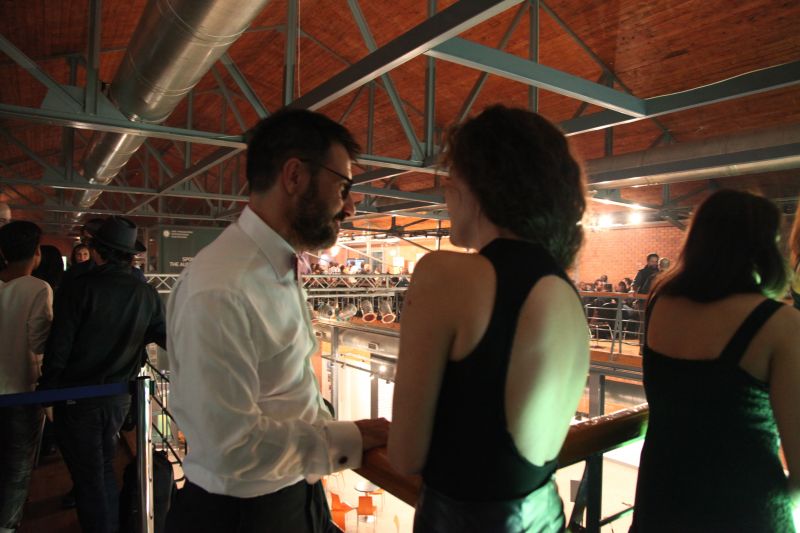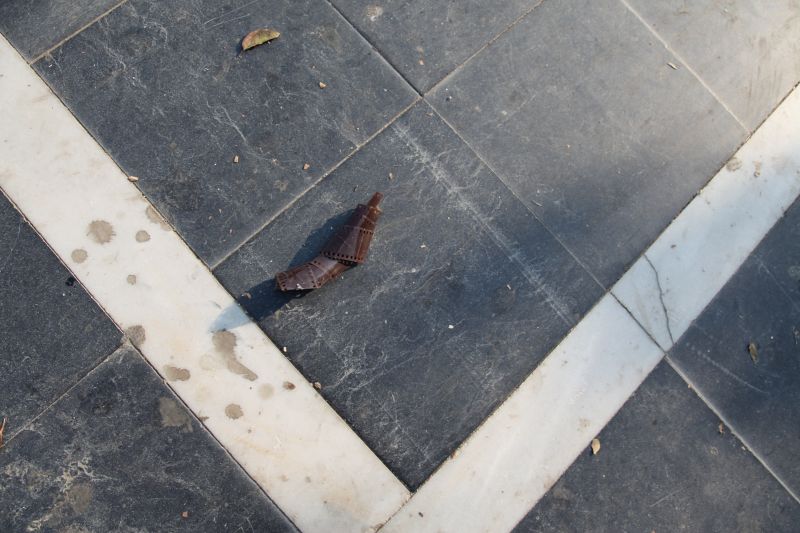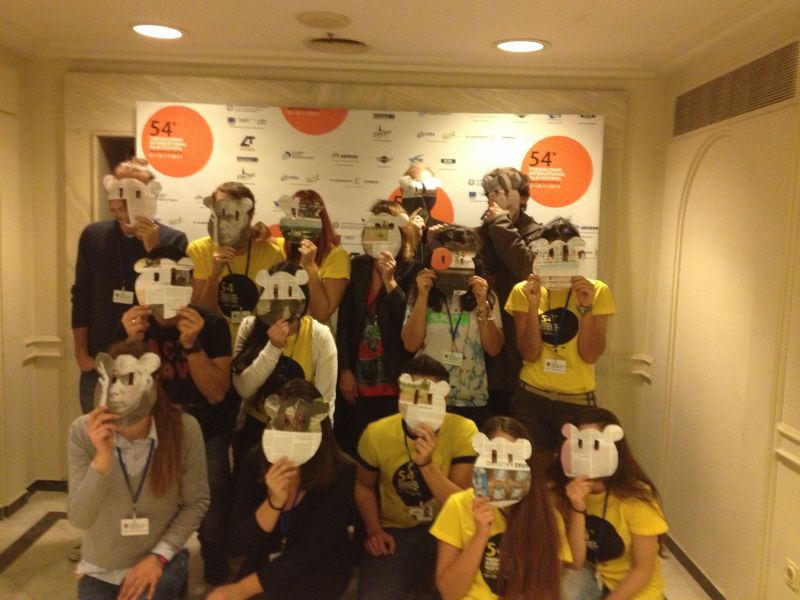|
|
||
|
Pro Tools
FILMFESTIVALS | 24/7 world wide coverageWelcome ! Enjoy the best of both worlds: Film & Festival News, exploring the best of the film festivals community. Launched in 1995, relentlessly connecting films to festivals, documenting and promoting festivals worldwide. Working on an upgrade soon. For collaboration, editorial contributions, or publicity, please send us an email here. User login |
Interview with Romain Gavras
Notre Jour Viendra synopsis: "What do you do when you're a red-haired teenage loser with no friends except for an older guy, your shrink? When everyone hates you, especially your family? When all your peers make fun of you and kick you around? "
Well, check out RG's teaser, a veritable kick in the head: http://vimeo.com/11900359
Daring, passionate, visionary and unapologetic filmmaker Romain Gavras made his cinematic debut with ‘Notre Jour Viendra' (Our Day Will Come) (2010) in Toronto this past September and made his debut in Greece with the same film at the 51st Thessaloniki Film Festival this past week. Romain is the son of legendary filmmaker Costa Gavras and he is the co-founder of Kourtrajme with Kim Chapiron. On December 08, 2010, Romain and I sat down at the Electra Palace Hotel in Thessaloniki just before his screening of Our Day Will Come, where we spoke at length about his career as feature filmmaker.
We sat down in red leather couches in front of a mauve toned painting of the White Tower of Salonica and began our interview and I couldn't help but wonder over how fitting this reddish setting was for an interview on a film about redheads, blood and living in the red zone.
ME: Can you tell us what ‘Notre Jour Viendra' means?
RG: It means ‘Our Day Will Come'. It's a road movie about two French outcast people that basically take the road, quit everything about their life and try to go to Ireland to create a new country because they are ginger and they feel very strong about their community that doesn't exist and they want to basically go to Ireland but they don't succeed.
ME: And it was originally going to be called ‘Redheads'?
RG: Yeah, it was before we had the title but I didn't really like it.
ME: So this is your break out first feature film and you are coming from a background in music videos, including the much talked about ‘Born Free'. Can you tell us about what it was like to shoot your first feature film?
RG: Yes. Well, it's something I've wanted to do for a long time. I've had experience doing short movies and music videos in other countries but doing a proper film was something completely different which I really enjoyed and I really had fun and I worked with all my team that I have created over ten years... with all my actors and my technicians so it went very smoothly because we all knew how to work together already.
ME: You had a film family already.
RG: Exactly.
ME: And you were born into as well.
RG: And I was born into it. I mean, it was a complete asset because I was running around sets since I was born basically so I had a chance to be in this environment so very very young and to feel very confident about myself. I mean, directing is all about confidence so it was a natural thing to me.
ME: And some of your audience is describing you as bold and brilliant and some as shocking and provocative. What do you feel about that?
RG: I don't know. I feel there is as many viewers as opinions on stuff you make so I think it's normal to have like... because I do stuff I really like and I don't try to tell the audience to explain or to show what they want to see so of course there are going to be distractions and people that like it or don't like it in a strong way.
ME: So, can you explain what inspired you to make this film?
RG: The idea behind it was with my co-writer, Karim Boukerchat, to make a film basically about freedom and so freedom everywhere, freedom in the writing of the script. We don't tell much about the characters. We don't tell much to the audience of what is going on. We try to lose a bit the audience sometimes. Freedom in the filmmaking of it. Also we had very little money but we had all the freedom to make want we wanted, freedom in the story. The story tells about true people that basically want to be free which is an impossible quest. So, yeah, I think it was... Even when you watch the film, I think the whole idea behind it was of this impossible quest of freedom.
ME: So, who is ‘Our' in ‘Our Day Will Come?' Would you say that ‘our' is social and racial outsiders? Or anyone who is marginalized?
RG: I don't know. I think it's whoever feels that this story talks to them is who is ‘Our'.
ME: It kind of reminds me of a modern day Don Quixote.
RG: Yeah, the book it's of course a book I really like. The film is completely different and not on the same level at all but the way it works between the two characters is Vincent is like crazy fighting against stuff that doesn't exist because there is a lot of paranoia as well in the film and they are not always right to fight about what they fight about so there is this kind of dynamic that between the two characters that is taken a bit from Don Quixote.
ME: And there is this dichotomy between both characters where one talks all the time and the other is more active.
RG: Yeah. That's the thing of generation. The generation of Vincent in the film. He is like 45 or something. It is a generation that talked a lot that came after the 60s and the forefront that came after the youth then in France and the youth right now has no talking whatsoever but they are very into fighting and rioting and revolt without the talk so it has a bit of this aspect of the war in French society.
ME: And it's filmed very beautifully and poetically despite being filmed in the industrial zone.
RG: Yeah, I think it's a point of view of what is beautiful and what is poetic and what is disgusting and stuff. A lot people think ‘oh, its Northern France and it's really ugly and blah blah blah', but I think in the desperate lands of this place there is some very strong feeling and some beauty and I think we try to capture it with the film. It's because it's gloomy that it has a really strong vibration and a really strong atmosphere. You know, most films in France are shot in the south of France because it's sunny and especially because it's nice to shoot there and it's obviously beautiful, but I don't have the same perspective.
ME: What was it like working with Vincent Cassel and Olivier Barthelemy?
RG: I mean, they're friends for such a long time. Olivier I've known him since I was 12 and Vincent he always helped us when we made short films when we were younger so I mean, it was a natural thing. He was a producer as well and he really helped me and was really behind me and trusted me so it was a really good thing.
ME: So, would you say this is kind of a road movie about going somewhere but not really getting anywhere?
RG: Yeah, it's a road movie that goes nowhere.
ME: I've seen some films like this lately, like some recent Egyptian films. Seems to be a trend. There's a whole journey to somewhere and yet no one gets anywhere.
RG: I think back in the day they made more hopeful movies because there was more hope but nowadays there is not a lot of hope so it's normal that films won't go anywhere.
ME: And what was it like to have your grand opening in Toronto?
R: Oh it was really good. I really liked the festival. We had a lot of fun. I think it was really well received. As always there were a lot of people that really like it and people who don't like it but it had a good reception I think.
ME: Now you're here in Thessaloniki and you have a whole year ahead of festivals. You released in September right?
RG: We released in September in France but we have been doing a lot of releases all over the world. So, we still have a few more countries to go to.
ME: Today with the battle between what films sell and those that apparently don't, like art films for example...What for you makes a great film?
RG: I think a great film is not about sales. Obviously you can see what sells. But I don't think there is a great film that sells. I mean, there are no instructions to make a good film. A good film is when you feel that it's a good film for you and it talks to you. But there were a few good films.
ME: I mean, but at least there is more freedom in Europe to make better quality films and art films.
RG: Yeah, we have a bit more freedom but not like it was in the 70s where there is still this idea of France that it's like it was you could make any kind of film about anything. It's not true anymore. It's really hard. Like in this film, we have Vincent Cassel in it and cost a very little budget but it's still really hard to find the money right now. It's possible but it's really hard.
ME: So, what are your next plans?
RG: I'm going back into writing very soon for a film. I'm doing a bit of commercial work on the side to not go on the script because I'm getting a few scripts and I don't want to do a film right now so I'm not to be forced to do films. I'm doing some commercials and also to finance a bit the next one.
ME: Are you producing out of your own company? RG: No, we have like two to three co-production companies we use.
ME: And how was the film received in France?
RG: Well, in France it was weirdly received. We had like issues with a lot of things. We had a very small release and we had good criticism and bad criticism but the release was so small compared to the press we had which was a bit disappointing. But we sold it to the whole world and that is really good. It's going really good in festivals and so...
ME: Is there any stories you would like to share about behind the scenes while making Notre Jour Viendra?
RG: Well, you know sometimes the stuff that happens in the kitchen is less mysterious if you talk about it. I mean, I'm not a fan of Making Ofs because of this. Basically, it was a six weeks shoot and it took over a year to make.
ME: Well, awesome, Romain. Thanks so much for talking with us about your film. You really have struck audiences with your debut and I'm sure you will continue to do so. Can't wait to see more of your work.
RG: Thank you! See Notre Jour Viendra at a festival near you! Or be sure to look for it in theaters and DVD.
See trailer here: http://www.youtube.com/watch?v=-s1I_IiVhww
Interview written by, Vanessa McMahon December 12, 2010 14.12.2010 | Thessaloniki International Film Festival's blog Cat. : 24 Hours 9 Album All Eyez on Me Brian Welch co-founder co-writer Contact Details Electra Palace Hotel Entertainment Entertainment Europe finance France Greece http://vimeo.com/11900359 http://www.youtube.com/watch?v=-s1I_IiVhww Interview with Romain Gavras Ireland Karim Boukerchat Kim Chapiron Kourtrajme Music Music industry Northern France Olivier Barthelemy Olivier I've Person Career Producer Romain Gavras Romain Gavras the 51st Thessaloniki Film Festival Toronto Vanessa McMahon VINCENT CASSEL White Tower of Salonica
|
LinksThe Bulletin Board > The Bulletin Board Blog Following News Interview with EFM (Berlin) Director
Interview with IFTA Chairman (AFM)
Interview with Cannes Marche du Film Director
Filmfestivals.com dailies live coverage from > Live from India
Useful links for the indies: > Big files transfer
+ SUBSCRIBE to the weekly Newsletter Deals+ Special offers and discounts from filmfestivals.com Selected fun offers
> Bonus Casino
User imagesAbout Thessaloniki International Film Festival Industry: CROSSROADS Co-Production Forum,AGORA, script-development BALKAN FUND. Competition for directors with 1st or 2nd films. Golden Alexander Prize 37.000 € Coverage by Vanessa McMahon, Laurie Gordon View my profile Send me a message The EditorUser contributions |



















